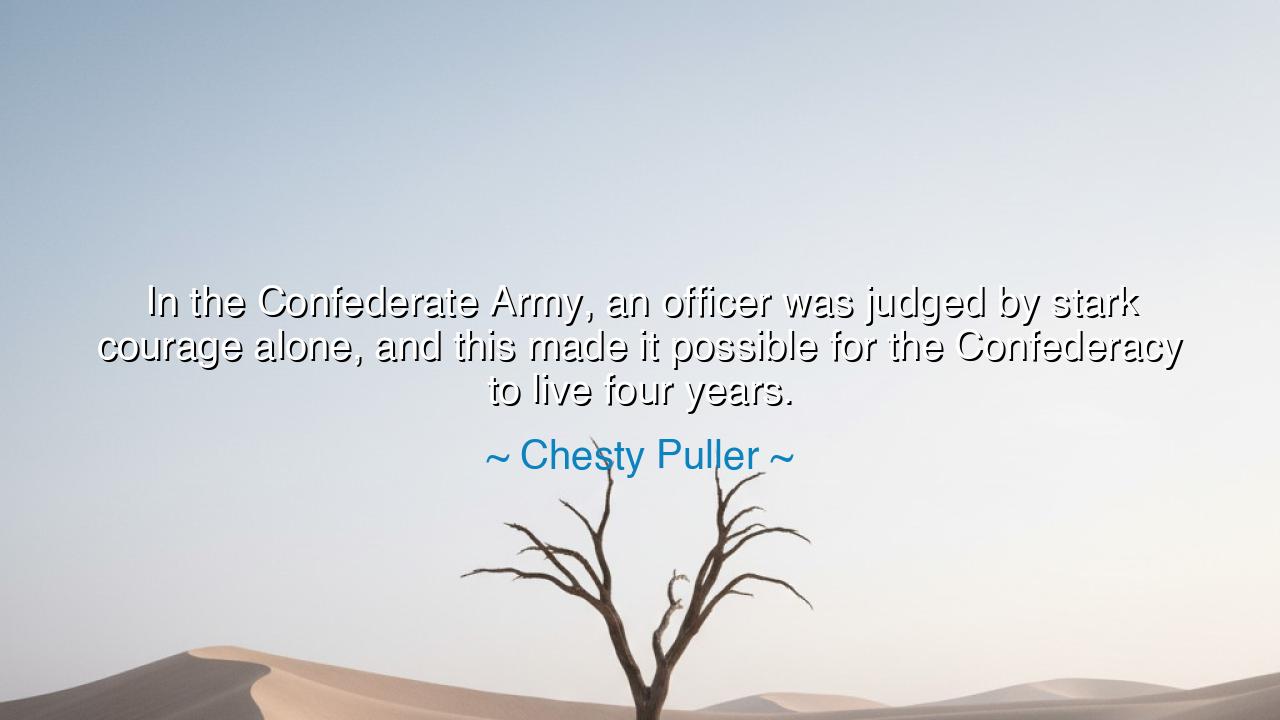
In the Confederate Army, an officer was judged by stark courage
In the Confederate Army, an officer was judged by stark courage alone, and this made it possible for the Confederacy to live four years.






“In the Confederate Army, an officer was judged by stark courage alone, and this made it possible for the Confederacy to live four years.” — Lewis ‘Chesty’ Puller
In these hard and uncompromising words, Chesty Puller, the legendary U.S. Marine, speaks not in admiration of a lost cause, but in reverence for the enduring spirit of courage. To him, courage was the steel that binds men together when all else fails — when resources are gone, when hope has thinned, and when the shadow of defeat looms. In the Confederate Army, he says, “an officer was judged by stark courage alone.” It was this raw, uncloaked valor — this ability to stand firm in the face of certain ruin — that sustained a doomed army for four years against overwhelming odds. Puller’s words rise beyond history to proclaim a universal truth: that courage, stripped of wealth, politics, and privilege, is the truest measure of leadership and survival.
Puller himself was a man forged in war’s furnace. Having fought in five major conflicts, from the jungles of Nicaragua to the brutal fields of Korea, he knew the weight of fear and the price of endurance. When he looked back upon the soldiers of the Confederacy, he saw not their cause, but their spirit — the sheer will that made men fight on when reason demanded surrender. For Puller, this was not a political reflection but a soldier’s recognition: that armies are not sustained by ideology, but by the hearts of the men who lead and follow. Without courage, the mightiest nation falls; with courage, even the weakest may endure.
The origin of this quote lies in Puller’s deep study of military history and his lifelong reverence for personal valor. He was known for his strict standards, his fearlessness, and his conviction that leadership is proven not in words, but in deeds. In invoking the Confederate officer, he was not glorifying rebellion, but defining a principle of endurance: that courage in its purest form is indifferent to circumstance. Whether in victory or in defeat, courage stands as the one virtue that cannot be conquered.
There is a long lineage of such wisdom in the ancient world. The Spartans at Thermopylae, facing certain death, held their ground not because they believed they could win, but because they refused to yield. Their courage bought time for Greece and earned them immortality. The same principle animated Chesty Puller’s Marines at the Chosin Reservoir in Korea, where surrounded by ten Chinese divisions and outnumbered nearly ten to one, he famously declared, “We’re surrounded. That simplifies the problem.” Like the Confederate soldiers he spoke of, Puller’s men survived because courage — not comfort, not abundance — became their weapon.
In his reflection, there is also a moral fire: that true courage is stark, without adornment or pretense. It does not ask for reward, nor does it depend on recognition. It exists in the simple act of doing one’s duty under impossible odds. Puller admired this quality because it represents the essence of integrity — to stand where one is placed, to hold one’s ground even when no one is watching. It is this kind of courage, he believed, that keeps not only armies alive, but nations, families, and the very soul of mankind.
Yet Puller’s words also carry a somber undertone. The Confederacy, for all its valor, was fighting for a cause that could not stand the test of justice. Courage alone can prolong life, but it cannot sanctify it. The quote thus bears a silent warning: that courage, though noble, must be guided by righteousness. Strength without truth is a storm without light. Even so, Puller honors courage wherever it is found, for it remains the foundation upon which all greater virtues are built.
So, O listener, take this lesson from the Marine who revered the warrior’s heart: courage is the soul’s iron, the measure of every leader and the pulse of every struggle. Let your courage be clean — untainted by vanity or malice — and let it be steady, not loud. For courage is not the absence of fear, but the mastery of it; not the promise of triumph, but the refusal to surrender. Remember this truth, proven in battlefields and in life: greatness endures only where courage stands watch — and where men, though surrounded by despair, still choose to fight on.






AAdministratorAdministrator
Welcome, honored guests. Please leave a comment, we will respond soon